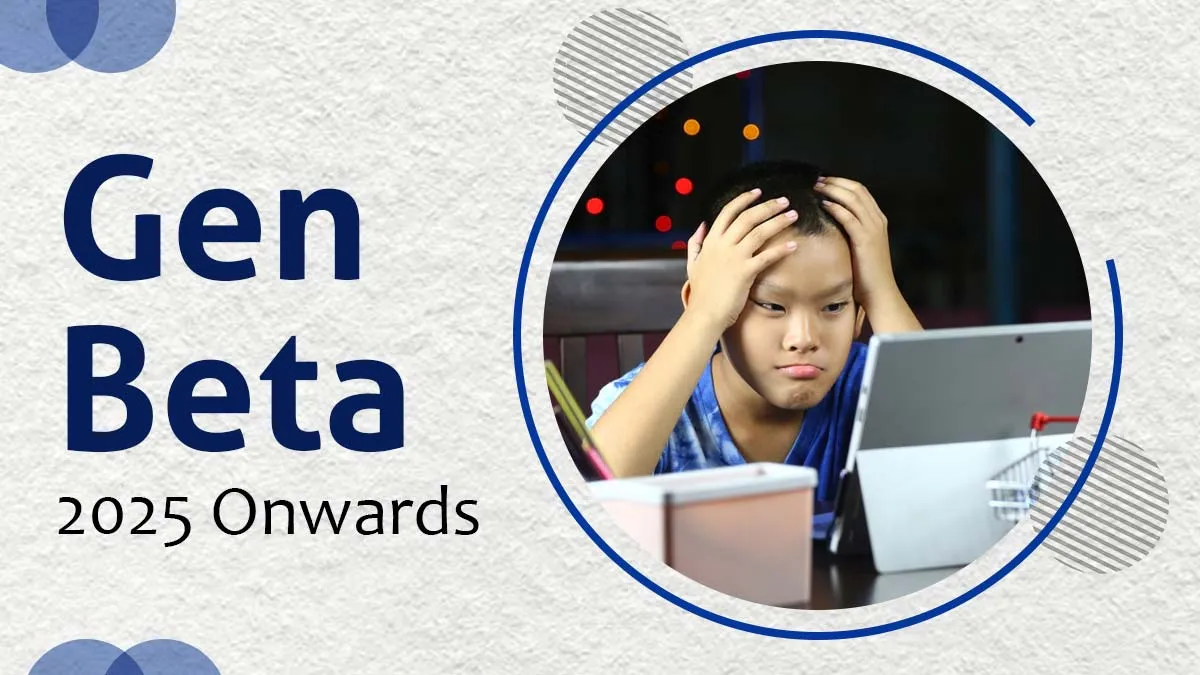
As the world approaches the dawn of 2025, a new generation is set to emerge, known as Generation Beta. This cohort will encompass children born from January 1, 2025, through approximately 2039, following Generation Alpha (2010-2024), Generation Z (1996-2010), and millennials (1981-1996) in the generational timeline.
Table of Content:-
The concept of generational cohorts has become increasingly relevant as we seek to understand the unique experiences and characteristics that shape different age groups. Each generation is influenced by its time's socioeconomic, political, and technological landscape.
What Is Gen Beta?
-1735624579497.jpg)
Gen Beta or Generation Beta refers to individuals born from January 1, 2025, to approximately 2039. This generation will grow up in a technology-driven world, characterised by widespread use of artificial intelligence, autonomous transportation, and immersive digital experiences. Nicknamed ‘Beta Babies’, it will be a successor to Gen Z and Gen Alpha.
Social researcher Mark McCrindle, who has played a pivotal role in defining generational labels, wrote in his blog and predicts that Generation Beta will constitute about 16% of the global population by 2035 and many will likely witness the onset of the 22nd century. The new generation will face unique challenges such as climate change and social inequality, shaping their identities and values as they adapt to an ever-evolving landscape.
ALSO READ: Managing Your Child’s Heart Disease: A Parent’s Essential Guide
Characteristics Of Gen Beta
Generation Beta is expected to exhibit several defining characteristics as they grow up in a highly advanced technological landscape. While it is still early to fully define this generation, some emerging characteristics of the babies taking birth in 2025 and after may include the following.
- Tech Savviness: Growing up with integrated technology, including AI and autonomous vehicles, will make them highly fluent in digital tools.
- Social Consciousness: They are likely to be aware of global issues like climate change and social inequality, prioritizing sustainability and ethical consumption.
- Adaptability and Resilience: Exposure to rapid technological advancements will foster strong adaptability and resilience in navigating change.
- Personalised Learning: Education will be tailored through adaptive technologies, allowing for individualised learning experiences.
- Global Perspective: Increased connectivity will encourage a valuing of diversity and cross-cultural collaboration.
- Creativity and Innovation: Early exposure to immersive technologies may enhance their creativity and problem-solving skills.
ALSO READ: Even Men Have PMS Symptoms! Exploring The Irritable Male Syndrome (IMS)
Gen Beta Will Have A Stronger Emphasis On Mental and Emotional Health
-1735624604620.jpg)
Set to be born from 2025 to around 2039, Generation Beta is expected to place a greater focus on mental and emotional health. With parents from the millennial and older Gen Z generations prioritising well-being, this new generation may benefit from more open conversations about mental health and better access to resources that help build emotional strength.
Gen Beta will likely have access to advanced wearable health devices that track vital signs and encourage healthy lifestyles from a young age. This use of technology in health management can promote proactive approaches to personal well-being.
What Will Be The Challenges For Gen Beta?
While Gen Beta is poised to thrive in a tech-savvy environment, the kids born in 2025 and after will inherit significant challenges. Some of them are mentioned below.
- Climate Change: They will inherit a planet affected by climate change, necessitating a strong commitment to sustainability and environmental responsibility.
- Urbanisation: Rapid urban growth may lead to overcrowding and resource scarcity, requiring innovative solutions to urban issues.
- Technological Integration: The pervasive use of AI and automation could raise concerns about privacy, security, and the impact of digital interactions on mental health.
- Social Connectivity: Navigating social media pressures may affect their ability to form meaningful connections and impact their emotional well-being.
- Economic Uncertainty: Economic fluctuations and job market changes driven by technology may create challenges for future employment opportunities.
However, Gen Beta will need resilience and adaptability to tackle these complex global issues as they shape their future. Babies born in 2025 and after, represent a significant shift in the generational landscape. Their upbringing in a tech-driven world and facing societal challenges will make them adaptable and resilient, preparing them to tackle future complexities.
Also watch this video
How we keep this article up to date:
We work with experts and keep a close eye on the latest in health and wellness. Whenever there is a new research or helpful information, we update our articles with accurate and useful advice.
Current Version